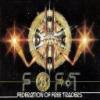In computer programming, a program chrestomathy is a collection of similar programs written in various programming languages, for the purpose of demonstrating differences in syntax, semantics and idioms for each language. This term is thought[according to whom?] to have been first used by Eric S. Raymond in the Retrocomputing Museum web site. It is used by analogy to a linguistic chrestomathy.
http://en.wikipedia.org/wiki/Chrestomathy
http://stackoverflow.com/questions/1527573/language-syntax-comparison
I have been thinking of making something like this myself, and today when looking up language syntax comparisons, I found out that there is actually a name for it. CHRESTOMATHY!
The chrestomathies I found looking through Stack Overflow are not quite verbatim, but I guess that is how languages are? Perhaps there is always some interpretation going on?
Check out this list for making a hello World Program.
And check out the various tasks that are collected for over 500 languages.
It would be nice if there were game chrestomathies, or perhaps it would be a nice thread on this site? It would probably have to be more than a thread, perhaps a whole new category.
I would only expect the top languages to be mentioned here, like C++, Lua, C#, Java, etc.
Anyone know of any game programming related chrestomathies for C++ to Lua? Or perhaps from C++ to Java?
I would like some for Lua to C++ particularly.






